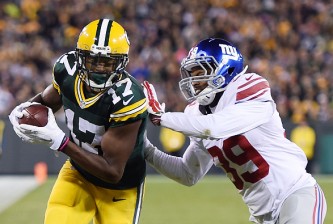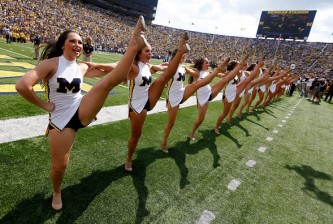This is the first of what I hope will be weekly Sunday posts. I’ll provide three or four thoughts into one post and I hope you enjoy them. Consider this to be a throwback to when sports media writers would write a lengthy column in the Sunday newspapers. As I mentioned, I hope to make this a regular occurrence at Fang’s Bites. I hope you’ll like it.
Can Other Sports Lend Themselves to Multiple Networks?
It’s obvious that the NCAA Tournament on CBS/TBS/TNT/truTV has been a phenomenal success. By having all of the games available nationally on four networks in the first three rounds, viewers watched in droves and in higher numbers than in previous years. Instead of waiting for CBS to make a switch to another game during a blowout or having to purchase the March Mega Madness pay per view package on DirecTV, viewers could do it themselves by either looking at the scoreboard bug on top of the screen or having the game announcers give an alert or even through social media like Twitter which gave alerts to close games.
The ratings have proved that airing four games simultaneously adds interest and eyeballs to the TV set. You’ll have a blowout here and there, but you can turn away if you so desire.
CBS/Turner’s spreading the games over four networks got me to thinking what other sports could use the NCAA Tournament treatment and I immediately thought baseball. You have four League Division Series and with TBS already having the rights to the entire LDS, why not spread them out to TNT and truTV? You don’t have to have four games at once, perhaps TBS can start with a game at 4 p.m. Eastern, then have three games at 7:30 p.m. on TBS again, TNT and truTV. And you won’t have to worry about airing a game at 10 or 11 p.m. which would anger East Coast fans.
What about other sports? The NBA used to have playoff games on TBS and TNT. Instead of spreading series out over a span of two weeks, why not go to the old system of conducting them every other night and having TNT and ESPN involved? Commissioner David Stern could stagger start times, Eastern Conference series could tip off at 7 and 8 p.m. Eastern, then the Western Conference would tip at 9:30 and 10:30 respectively. Or the games could begin a half-hour apart.
The NHL could do something similar with Versus and other another cable partner, say ESPN2 perhaps or even NHL Network. The possibilities are endless
And if NBC ever came to its senses and decided to truly show the Olympics live, we could see events on multiple networks such as track and field on NBC, basketball on Versus, gymnastics on USA Network, diving on MSNBC and cycling on Bravo. Do it, NBC.
So as you can see, this can be done provided the sports leagues allow it. But this would heighten interest and provide the viewer with more games and more choices.
The Insanity of 3-D TV
Over the last few weeks, I have seen articles about the slow sales of 3-D TV throughout the country. I have also seen articles about Best Buy’s stock being downgraded over poor sales due to 3-D TV and other factors. The fact that 3-D TV has not taken off tells me one thing. Americans aren’t interested in buying another expensive TV set after making the investment to HDTV.
Let’s face it. The digital conversion from analog TV to High Definition was botched by the Feds. The date of the mandatory conversion kept getting pushed back to 2009 when it was finally decided that it could not be pushed back any further. It didn’t matter, the forced drop dead date was still confusing to some who thought that TV as they knew was coming to an end. Some people to this day still don’t have TV coming to their homes. However, most people did make the conversion to high definition, in some cases, spending well over $1,000 to make the change.
Now after making the transition to HDTV, TV manufacturers rushed out 3-D TV sets based on the success of the movie, Avatar. However, one movie does not a whole movement make. The fact that there’s hardly a surplus of 3-D programming, ESPN 3D asides, people don’t have the urge to buy a 3-D set. In addition, the economy has hit many Americans right in the wallet or pocketbook. They aren’t rushing to Best Buy or other electronic retailers. Many Americans aren’t thinking they’re missing anything by not owning a 3-D TV. Asking people to buy a $3,000 set after they’ve already spent money on new HD TV’s just two years previous is like asking them to waste money like a local government. It’s not going to happen.
In addition, their favorite sports aren’t making a big push to go 3-D. The NFL is very skeptical about putting its games in the third dimension and the league certainly doesn’t see it as a moneymaker.
So where does this leave us with 3-D? Right where it started, struggling to find an audience. I don’t see 3-D taking off as network executives and TV manufacturers had hoped. And even when the economy bounces back, I don’t see a huge wave of people looking to buy 3-D. Let’s call this for what it is, 3-D TV is a colossal failure.
The Masters
You know The Masters is coming when you hear that familiar theme, “Augusta” being played during the NCAA Tournament and even on promos on the CBS Evening News. For many people, it will be the first golf tournament on which they will pay attention.
For me, The Masters is a true sign that spring is here. My only problem with The Masters is the referential treatment from CBS. Granted, Augusta National calls the shots and signs one year renewals with CBS, but sometimes the restrictions by the membership can go too far. Announcers like Jack Whitaker and Gary McCord were booted from CBS’ coverage for saying things that Augusta National didn’t like.
We haven’t any similar incidents at The Masters in the past few years, but one has to think that we’re due based on CBS’ track record which has been quite good.
More Sunday thoughts coming next week.






















